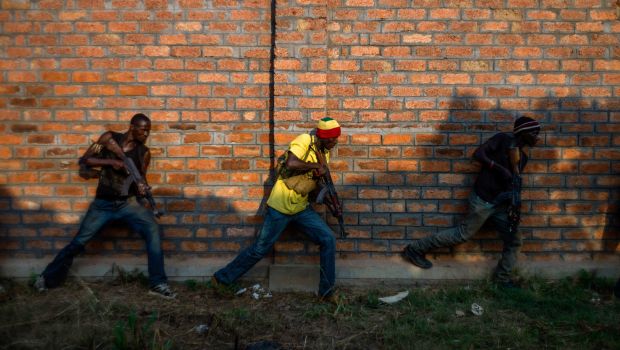
Members of the former Central African Armed Forces (FACA) and anti-balaka Christian militia take part in a drill in the suburbs of Bangui, on December 17, 2013. (AFP PHOTO/FRED DUFOUR)
Bangui, AP—After a period of relative calm, violence flared anew Friday in the Central African Republic with shootouts at checkpoints, the destruction of a mosque and angry demonstrations against Chadian peacekeepers that left at least 30 dead.
The impoverished country has been chaotic since Muslim rebels, known as the Seleka, overthrew the government and installed a Muslim president in this majority-Christian nation.
After overnight shootings involving Chadian peacekeepers, violence exploded once more with mobs attacking Muslim neighborhoods and a shootout at a checkpoint manned by Congolese troops left three dead.
“We are here to keep the peace, if they draw on us, we shoot back,” said a soldier from Congo-Brazzaville, gesturing at the corpse at his feet.
The soldier, who spoke on condition of anonymity because he was not authorized to speak to the press, said two cars filled with what he described as Seleka supporters of President Michel Djotodia pulled up at the checkpoint and opened fire. One of the cars was a smoking ruin while the other’s windows were smashed with shell casings littered around it. Two other corpses lay nearby.
The local office of the Red Cross put the death toll since the shootings the night before at more than 30 people, estimating that 583 have died since hostilities flared on December 5.
In the Gobango neighborhood, a crowd surrounded a two-story mosque and tore it pieces, smashing the walls and peeling off its corrugated iron roof. Members of the crowd said they wanted all Muslims to leave, linking them with the Chadian portion of the multinational peacekeeping force which they accuse of shooting at civilians.
“Theirs is a culture of hate, we aren’t like that, all the mosques must go,” shouted Clavert Bettare, one of the protesters. Behind him, people—many wearing crucifixes—tore up books full of Arabic writing and punched holes in the building’s wall.
Muslims make up about 15 percent of the Central African Republic’s population and have largely lived in harmony with the country’s Christian majority. The takeover by mainly Muslim rebels this spring, however, has inflamed sectarian tensions, sparking attacks by Christian militias against Muslim neighborhoods, while the Muslim president’s forces are accused of revenge attacks.
In the middle are French troops backed by contingents from Chad, Congo, Equatorial Guinea, Burundi and Gabon. The US has pledged 100 million dollars to help equip and train these forces.
A few hundred people marched through a market place near the airport waving palm fronds and calling for the resignation of Djotodia and the expulsion of the Chadian peacekeepers, whom they say support him.
“We want the return of François Bozizé and an end to the Chadian troops, this is not their country,” said a young woman, referring to the deposed president.
Djotodia rode in a Chadian armored vehicle Thursday for his meeting with American ambassador to the United Nations, Samantha Power, in which she reminded him of his commitment to step down after organizing elections. At the conclusion of her visit, Power cautiously noted that the situation was improving. However, soon after her plane took off around sunset, the shooting began anew.
The lobby of Bangui’s community hospital Thursday was choked with the wounded from an early morning raid by Christian militias on the mainly Muslim Kilometer-5 neighborhood. Doctors said they had treated at least 35 injured people, with two dying from their wounds. One young man lay on the floor covered by a foil emergency blanket with five bullet wounds while orderlies mopped up pools of blood on the floor.
“It’s complicated today,” said a French soldier at a checkpoint in the city not far from where the mosque was destroyed.
